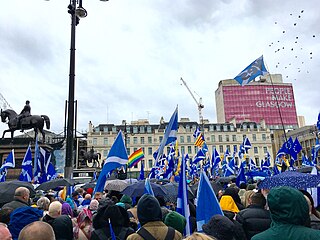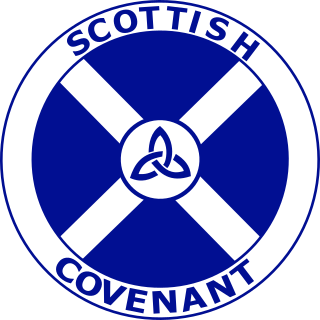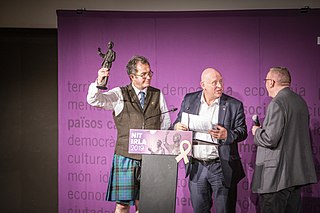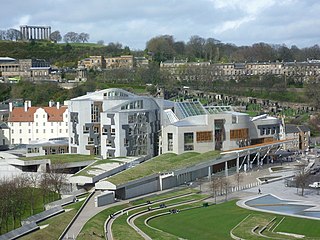
Scotland is a country that is part of the United Kingdom. It contains nearly one-third of the United Kingdom's land area, consisting of the northern part of the island of Great Britain and more than 790 adjacent islands, principally in the archipelagos of the Hebrides and the Northern Isles. To the south-east, Scotland has its only land border, which is 96 miles (154 km) long and shared with England; the country is surrounded by the Atlantic Ocean to the north and west, the North Sea to the north-east and east, and the Irish Sea to the south. The population in 2022 was 5,436,600 and accounts for 8% of the population of the UK. Edinburgh is the capital and Glasgow is the largest of the cities of Scotland.
The Scottish National Party is a Scottish nationalist and social democratic political party. The party holds 63 of the 129 seats in the Scottish Parliament and 43 out of the 59 Scottish seats in the House of Commons in Westminster. It has 453 local councillors of 1,227.

Scottish independence is the idea of Scotland regaining its independence and once again becoming a sovereign state, independent from the United Kingdom. The term Scottish independence refers to the political movement that is campaigning to bring it about.
James Sillars is a Scottish politician and campaigner for Scottish independence. Sillars served as a Labour Party MP for South Ayrshire from 1970 to 1976. He founded and led the pro-Scottish Home Rule Scottish Labour Party in 1976, continuing as MP for South Ayrshire until he lost the seat in 1979.

The Scottish Covenant was a petition to the United Kingdom government to create a home rule Scottish parliament. First proposed in 1930, and promoted by the Scots Independent in 1939, the National Covenant movement reached its peak during the late 1940s and early 1950s. Initiated by John MacCormick, the Covenant was written in October 1949 at the Church of Scotland Assembly Halls in Edinburgh, during the Third National Assembly of the Scottish Convention, a pressure group which evolved into the Scottish Covenant Association.

The Scottish devolution referendum of 1997 was a pre-legislative referendum held in Scotland on 11 September 1997 over whether there was support for the creation of a Scottish Parliament with devolved powers, and whether the Parliament should have tax-varying powers. The result was "Yes–Yes": a majority voted in favour of both proposals, and the Parliament was established following an election in 1999. Turnout for the referendum was 60.4%.

Scottish nationalism promotes the idea that the Scottish people form a cohesive nation and national identity.

Chris Bambery is a Scottish political activist, socialist, author, journalist, TV presenter and producer, most recently with the Islam Channel where he hosts their current affairs programme The Report.

Unionism in Scotland is a political movement which favours the continuation of the political union between Scotland and the other countries of the United Kingdom, and hence is opposed to Scottish independence. Scotland is one of four countries of the United Kingdom which has its own devolved government and Scottish Parliament, as well as representation in the UK Parliament. There are many strands of political Unionism in Scotland, some of which have ties to Unionism and Loyalism in Northern Ireland. The two main political parties in the UK — the Conservatives and Labour — both support Scotland remaining part of the UK.

In the United Kingdom, unionism is a political stance favouring the continued unity of England, Scotland, Wales and Northern Ireland as one sovereign state, the United Kingdom of Great Britain and Northern Ireland. Those who support the union are referred to as Unionists. Though not all unionists are nationalists, UK or British unionism is associated with British nationalism, which asserts that the British are a nation and promotes the cultural unity of the Britons, which may include people of English, Scottish, Welsh, Irish, Cornish, Jersey, Manx and Guernsey descent.

Since 1922, the United Kingdom has been made up of four countries: England, Scotland, Wales and Northern Ireland. The UK Prime Minister's website has used the phrase "countries within a country" to describe the United Kingdom. Some statistical summaries, such as those for the twelve NUTS 1 regions of the UK, refer to Northern Ireland, Scotland, and Wales as "regions". With regard to Northern Ireland, Scotland and Wales particularly, the descriptive name one uses "can be controversial, with the choice often revealing one's political preferences".

Devolution is the process in which the central British parliament grants administrative powers to the devolved Scottish Parliament. Prior to the advent of devolution, some had argued for a Scottish Parliament within the United Kingdom – while others have since advocated for complete independence. The people of Scotland first got the opportunity to vote in a referendum on proposals for devolution in 1979 and, although a majority of those voting voted 'Yes', the referendum legislation also required 40% of the electorate to vote 'Yes' for the plans to be enacted and this was not achieved. A second referendum opportunity in 1997, this time on a strong proposal, resulted in an overwhelming 'Yes' victory, leading to the Scotland Act 1998 being passed and the Scottish Parliament being established in 1999.

In the United Kingdom, devolution is the Parliament of the United Kingdom's statutory granting of a greater level of self-government to the Scottish Parliament, the Senedd, the Northern Ireland Assembly and the London Assembly and to their associated executive bodies: the Scottish Government, the Welsh Government, the Northern Ireland Executive and in England, the Greater London Authority and combined authorities.
Events from the year 2014 in Scotland.
This page lists the public opinion polls that were conducted in relation to the 2014 Scottish independence referendum, that was held on 18 September 2014. Overall, polls showed that support for a "No" vote was dominant until the end of August 2014, when support for a "Yes" vote gained momentum and the gap closed significantly, with at least one poll placing the "Yes" vote ahead. In the final week of the campaign, polls showed the "No" vote to be consistently but somewhat narrowly ahead. There were no exit polls although a YouGov post-election poll was published shortly after the polls closed. For the history of the campaign itself see 2014 Scottish independence referendum, Yes Scotland, and Better Together (campaign).

The Smith Commission was announced by Prime Minister David Cameron on 19 September 2014 in the wake of the 'No' vote in the 2014 Scottish independence referendum. The establishment of the commission was part of the process of fulfilling The Vow made by the leaders of the three main unionist parties during the last days of the referendum campaign. The Vow promised the devolution of more powers from the Parliament of the United Kingdom to the Scottish Parliament in the event of a No vote.

A second referendum on the independence of Scotland from the United Kingdom (UK) has been proposed by the Scottish Government. An independence referendum was first held on 18 September 2014, with 55% voting "No" to independence. The Scottish Government stated in its white paper for independence that voting Yes was a "once in a generation opportunity to follow a different path, and choose a new and better direction for our nation". Following the "No" vote, the cross party Smith Commission proposed areas that could be devolved to the Scottish Parliament; this led to the passing of the Scotland Act 2016, formalising new devolved policy areas in time for the 2016 Scottish Parliament election campaign.

Federalism in the United Kingdom aims at constitutional reform to achieve a federal UK or a British federation, where there is a division of legislative powers between two or more levels of government, so that sovereignty is decentralised between a federal government and autonomous governments in a federal system.

Northern England devolution is the broad term used to describe the wish for devolved governmental powers that would give more autonomy to the Northern Counties.

Welsh devolution is the transfer of legislative power for self-governance to Wales by the Government of the United Kingdom.














